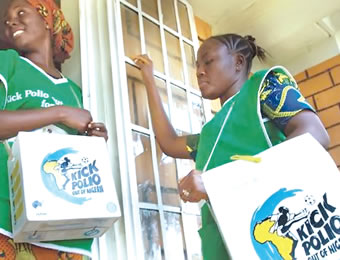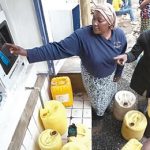A year away from being certified polio-free, a resurgence of polio cases has dented Nigeria’s attempt at being certified free. Two new wild-polio cases in the north-eastern state of Borno returned the country to the global map of countries with polio. SADE OGUNTOLA examines factors involved in Nigeria’s recent near miss of complete polio eradication.
A year away from being certified polio-free, a resurgence of polio cases has dented Nigeria’s attempt at being certified free. Two new wild-polio cases in the north-eastern state of Borno returned the country to the global map of countries with polio.
With the setback, Nigeria must now wait at least until mid-2019 without new outbreaks to receive polio-free certification.
“So we are starting all over again. Those two years are now gone with all the money and efforts put to work. So that is the problem,” said Dr Adekunle Adeniji, Director of World Health Organisation (WHO) National Polio Laboratory, Department of Virology, University of Ibadan (UI).
Adeniji stated, “It is a sad thing because these are indigenous viruses that have been circulating since 2011 but were not found because our surveillance is not sensitive enough not to pick them.
“If they were the imported ones, we would have been given 90 days to clear it. And if nothing again was found, then we would have continued with the process of being certified polio-free.”
Nonetheless, Dr Adeniji said the two cases of polio in this migrant population may have arisen also because of poor immunisation coverage due to Boko Haram insurgency in the area.
He said, “North-eastern Nigeria is still a challenge because of Boko Haram and getting health workers there is an issue. Recently, some health workers were killed in the area. This is aside the UN operatives that were recently killed.”
Dr Adeniji, noting the possibility of the wild polio spreading south wards because of migrant such as Fulani herdsmen, stated: “We are praying that this does not occur. The way we are in Nigeria, there is no barrier to movement. The migrant populations like the herdsmen cannot be pinned down to any particular place.”
Professor Georgina N. Odaibo, Head, Department of Virology, University of Ibadan, declared that the resurgence will give opportunity for the routine and regular immunisation to take place, and as such reduce the possibility of the virus reoccurring in the community.
Odaibo declared, “It is wild polio actually and that is why it is a problem. If it is vaccine strain, there is no problem. We are vaccinating people and we expect to have the vaccine strains around.”
The medical expert said access to health facilities, including vaccination may be an issue with internally displaced persons and as such there health needs must be taken more seriously.
According to her, “It is a well known phenomenon that in areas where you have insecurity, the health of the people is also a problem because they do not have access to the level of healthcare that is required. It is not new.”
Can this also be a pointer to worsening malnutrition in the area? Professor Sunday Omilabu, a professor of virology at the University of Lagos, stated that in some instances vaccine strains of polio virus in circulation can also present as the wild polio virus strain in the individual’s with lowered immunity.
Omilabu, who remarked that only genetic testing could determine whether the discovered cases were not really vaccine strains of polio virus, declared that even a single case of polio virus was enough to be cause for alarm as it could rapidly spread and infect more people.
President, Association of Medical Laboratory Scientists of Nigeria (AMLSN), Alhaji Toyosi Raheem, however, said that the resurgence polio in Nigeria was a multi-dimensional problem.
Winning the polio fight, he said, required in-country production of this vaccine as well as quality control of polio vaccines imported into Nigeria.
“When a different strain from what is circulating locally is used to prepare vaccine, it may not be protective. That is why in the 70s and the 80s when the vaccines were produce in-country, they were more protective and more effective to an extent that Nigeria was exporting this to foreign countries especially those in West Africa.”
Also, Alhaji Raheem questioned individuals’ responsiveness to the Polio Laboratory Containment Committee set up by the Federal Government this year to collect and destroy all potential polio infective chemical sample or materials, a requirement for Nigeria to be polio free.
Raheem said many laboratories did not allow the committee to do its job, adding that such a material could be a danger in future polio control if individuals refrain from complying with such government’s directives.
President, Nigerian Medical Association (NMA), Professor Mike Ogrima said the two new wild-polio cases were indicative that routine immunisation exercise nationwide should not be a ceremonial, but part of our culture and tradition so that all children can get immunised from time to time.
Professor Ogrima declared: “Mothers and parents should take immunisation exercise very serious. When children are not immunised, they stand a chance of getting infections like polio that end up making some children paralysed.”
President, Nigerian Academy of Science, Professor Oyewale Tomori said the new outbreak of polio was because government’s commitment waned on polio eradication and complacency set in.
He declared: “This was particularly evident at the levels of the National Assembly, governors and local government area chairpersons.
“This complacency meant that polio eradication activities were no longer backed by adequate and timely counterpart funding at the state and local government area levels. This was despite a public and often vocal commitment to polio eradication from Nigeria’s President Muhammadu Buhari. As a result, gaps remained in the quality of immunisation and surveillance activities. These were especially prominent in the country’s security compromised areas.”
Nevertheless, Professor Tomori said that the situation was serious enough for the Presidential Task Force on Polio Eradication to be convened urgently.
Previously, Health Minister, Professor Issac Adewole, explained that the discovery and confirmation of the polio outbreak was a result of strengthened surveillance, only made possible by successful military action in liberating more communities in the north eastern region. “The overriding priority right now is to rapidly boost immunity in the affected areas to ensure that no more children are affected by this terrible disease,” he said.
The Nigerian authorities, along with experts from WHO, are currently investigating the situation to find out where the virus has spread.
In 2012, Nigeria had more than half of all polio cases worldwide, according to the WHO. The country has since taken big steps to eradicating polio, marking two years without a case on July 24, 2016 before this setback.
The WHO puts the reduction down to a “concerted effort by all levels of government, civil society, religious leaders and tens of thousands of dedicated health workers.”
The organisation also stated that the answer, for now, is to vaccinate all children, and as long as there are unvaccinated children, there will be a good chance of it surviving and spreading.
WATCH TOP VIDEOS FROM NIGERIAN TRIBUNE TV
- Relationship Hangout: Public vs Private Proposals – Which Truly Wins in Love?
- “No” Is a Complete Sentence: Why You Should Stop Feeling Guilty
- Relationship Hangout: Friendship Talk 2025 – How to Be a Good Friend & Big Questions on Friendship
- Police Overpower Armed Robbers in Ibadan After Fierce Struggle






